| Srl | Item |
| 1 |
ID:
187547
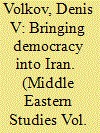

|
|
|
|
|
| Summary/Abstract |
Although the history of Russian-Iranian relations remains seriously understudied, few would refute the oppressive imperialist role played by Imperial Russia in Iran during the nineteenth century and the first two decades of the twentieth century. However, practically nothing has been written about the conceptual shifts which began to take place in Russia’s Persian policy immediately after the February Revolution of 1917. Little is known about the large-scale projects, through which Russia was to bring ‘its own democracy’ to Iranian Azerbaijan and its other northern provinces, with further proliferation all over Iran. This was meant to facilitate Russia’s political and trade expansion down to the Persian Gulf, which had been the eventual goal for many decades. Drawing on unpublished documents from Russian, British and French archives, this article studies the relevant correspondence between the Russian, British and French missions in Tehran and their central authorities during the decade 1909-1919, including the short-lived governments of Republican Russia. In doing so, it analyses the local agency of the Russian diplomats in Iran, such as Vladimir Minorsky (1877-1966), in the emergence of these projects, and investigates the manifestation of symbolic capital and the productive interaction of power/knowledge relations.
|
|
|
|
|
|
|
|
|
|
|
|
|
|
|
|
| 2 |
ID:
188487


|
|
|
|
|
| Summary/Abstract |
ON JUNE 29, 2022, Ashgabat hosted an important international event - the Sixth Caspian Summit. In this regard, I believe it is important to once again consider the role and place of the Caspian Region in the more just, democratic, and sustainable multipolar system that is taking shape today.
|
|
|
|
|
|
|
|
|
|
|
|
|
|
|
|
| 3 |
ID:
101181
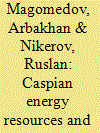

|
|
|
| 4 |
ID:
058302
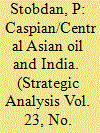

|
|
|
| 5 |
ID:
074838
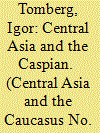

|
|
|
| 6 |
ID:
101186
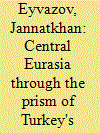

|
|
|
| 7 |
ID:
074837
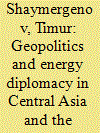

|
|
|
| 8 |
ID:
092616
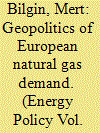

|
|
|
|
|
| Publication |
2009.
|
| Summary/Abstract |
This paper addresses issues of natural gas which raise questions about European energy security. It first focuses on the rising gas demand of the EU27 and elaborates alleged risks of dependence on Russia such as Gazprom's disagreement with Ukraine, which became an international gas crisis in January 2006 and also more recently in January 2009. Incentives and barriers of Europe's further cooperation with selected Caspian (Azerbaijan, Kazakhstan and Turkmenistan) and Middle Eastern (Iran, Iraq and Egypt) countries are discussed. Supplies from Caspian are analyzed with a particular focus on Russia's role and the vested interests in the region. Supplies from the Middle East are elaborated with regard to Iran's huge and Iraq's emerging potentials in terms of natural gas reserves and foreign direct investments in the energy sector. The geopolitical analysis leads to a conclusion that the best strategy, and what seems more likely, for the EU is to include at least two countries from Azerbaijan, Turkmenistan, Iran and Iraq within its natural gas supply system.
|
|
|
|
|
|
|
|
|
|
|
|
|
|
|
|
| 9 |
ID:
144193
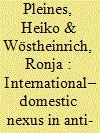

|
|
|
|
|
| Summary/Abstract |
This article looks at the application, in the anti-corruption realm, of the analytical framework developed for transnational human rights advocacy by Risse, Ropp, and Sikkink. Focusing on Azerbaijan, Kazakhstan, and Turkmenistan, this article shows that the level of integration with Western actors on the state and corporate levels determined the degree to which the transnational anti-corruption regime has been accepted in the Caspian region. As the transnational regime does ultimately lack coercive powers, the tension between transnational demands and national political elites does not translate into serious conflict, as a broader formal acceptance of the transnational anti-corruption regime offers national actors only limited opportunities to genuinely promote the issue.
|
|
|
|
|
|
|
|
|
|
|
|
|
|
|
|
| 10 |
ID:
117401
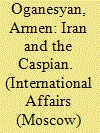

|
|
|
|
|
| Publication |
2012.
|
| Summary/Abstract |
FOR MANY REASONS, the wars are no longer what they were in the times of Carl von Clausewitz; the so-called total war, its concept and its practice, has become obsolete. In the past, the warring sides aimed at the total destruction of the enemy's manpower along the fronts and the manpower reserves in the rear; not infrequently, civilian population was also destroyed as a deterrent. Hitler was an adept in total war in its absolute form.
|
|
|
|
|
|
|
|
|
|
|
|
|
|
|
|
| 11 |
ID:
022895


|
|
|
|
|
| Publication |
Nov 2002.
|
| Description |
382-387
|
|
|
|
|
|
|
|
|
|
|
|
|
|
|
|
| 12 |
ID:
092763
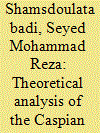

|
|
|
| 13 |
ID:
088991
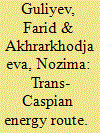

|
|
|
|
|
| Publication |
2009.
|
| Summary/Abstract |
The article delineates the major national, regional and international level stakeholders in the westward Trans-Caspian transportation of Kazakh oil, supplemented with a discussion of the prospect of expansion of the Trans-Caspian/South Caucasus corridor in light of the presumably harmful effect of the war between Russia and Georgia in August 2008. It demonstrates that while foreign companies have been backed by their respective governments, national firms have also enjoyed considerable state support, partly due to their close links to the interests of state elites in Kazakhstan and Azerbaijan. It appears that most companies along the shipping line either belong to the governments of Kazakhstan or Azerbaijan, directly or indirectly (through subsidiaries), or enjoy favoritism and a near monopoly in their markets (crony capitalism). Some of these firms are privately owned but registered in offshore tax havens, while some others have rather obscure ownership structures and corporate profiles. It suggests that cronyism and state capture comprise that politico-economic environment within which the future of Caspian transport systems will have to be decided.
|
|
|
|
|
|
|
|
|
|
|
|
|
|
|
|